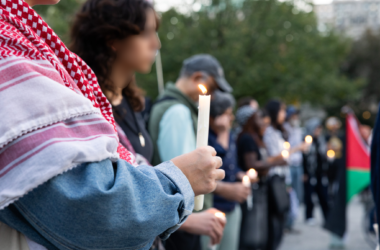 McGill Tribune
McGill Tribune
The most significant event on campus this week was not the 118 -hour long occupation of the James Administration Building. It was the administration’s response. Last Sunday, in an email to the student body, Vice Principal Anthony Masi unveiled a “provisional protocol,” a set of guidelines which lays down university laws on what forms of political protest the university is prepared to tolerate.
Not only were these guidelines hastily drawn up without any student consultation, but they are also remarkably vague and open to interpretation.
According to the second clause of the protocol, protests can now be stopped if they “impede the conduct of university activities.” This clause effectively allows the administration to stop any protest that makes any noise or gets in anyone’s way, and it is hard to imagine a demonstration, protest, or occupation which could not be declared an impediment in some way.
The clause has been taken from Article 5 of the Code of Student Conduct, a fair enough place from which to draw university guidelines, but the Tribune has noticed that Masi has omitted the second part of Article 5, which crucially adds, “Nothing in this Article or Code shall be construed to prohibit peaceful assemblies and demonstrations, lawful picketing, or to inhibit free speech.” Dropping this part of the clause is unacceptably disrespectful to McGill’s right to free speech and peaceful assembly.
The Tribune also believes that the introduction of the provisional protocol shows that the administration has learned the wrong lessons from Nov. 10, and has ignored the Jutras report’s findings. Dean Jutras clearly outlined that it would be “naive to expect that the boundaries of peaceful assembly can be set in stone in advance.” Yet that is exactly what administration is seeking to do; they are establishing a code before the thorough dialogue recommended by Jutras has even taken place. McGill students were promised an open forum to debate the limits of free speech. Now that the parameters have already been outlined, we do not have faith that it will permit more than a retrospective debate, with only a slim possibility of students having a say. The sole hope students may have have that their opinions will be acted upon lies only in a vague platitude from Heather Munroe-Blum which says, “elements of these rules might eventually change.”
Certainly, the tactics of the occupiers were reckless, unrepresentative, and without forethought. It is not unreasonable that the administration needs to take measures to avoid being routinely shut down by small groups of occupiers, and we acknowledge that valuable university property and sensitive records ought to be protected from damage or destruction. But the fairest way to do this is not to rapidly enact protocols which could empower the administration to smother protests entirely. These protocols appear to be an overtly defensive act, one designed to keep the university running at the cost of the right to protest.
We believe that the best way to stop protestors habitually occupying offices is to listen to the grievances and not just silence them. If the administration wishes to do so, it must truly regain the trust of students; it needs to start showing that they are prepared to listen to student concerns. They need to act in a way that shows a degree of consideration. It should not be acting on its own accord and then paying petty lip service to “dialogue” long after the administration has already gone ahead and made an executive decision. Furthermore, the administration must realise what their actions symbolise to certain members of the student body. For these students, the administration is unpopular for not appearing to have the best interests of students in mind. The administration may have been right to turn down the QPIRG and CKUT referenda for a lack of clarity, but many students see this action as an attempt to persecute two groups who help a sense of community among students.
Dean Jutras’s report cited the key concerns of all he interviewed as centring around clarity and community. By imposing the protocol for an indefinite amount of time, the administration is clearly disregarding the spirit of co-operation, community, and consultation that Dean Jutras proposed.





